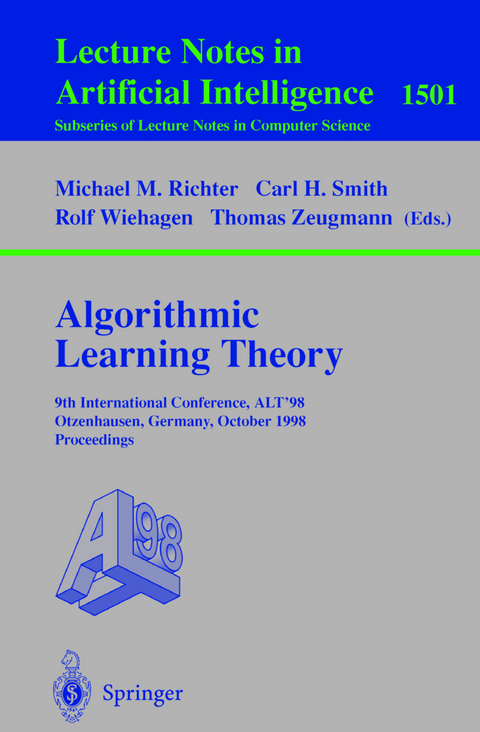
Algorithmic Learning Theory
Springer Berlin (Verlag)
978-3-540-65013-3 (ISBN)
Editors' Introduction.- Editors' Introduction.- Inductive Logic Programming and Data Mining.- Scalability Issues in Inductive Logic Programming.- Inductive Inference.- Learning to Win Process-Control Games Watching Game-Masters.- Closedness Properties in EX-Identification of Recursive Functions.- Learning via Queries.- Lower Bounds for the Complexity of Learning Half-Spaces with Membership Queries.- Cryptographic Limitations on Parallelizing Membership and Equivalence Queries with Applications to Random Self-Reductions.- Learning Unary Output Two-Tape Automata from Multiplicity and Equivalence Queries.- Computational Aspects of Parallel Attribute-Efficient Learning.- PAC Learning from Positive Statistical Queries.- Prediction Algorithns.- Structured Weight-Based Prediction Algorithms.- Inductive Logic Programming.- Learning from Entailment of Logic Programs with Local Variables.- Logical Aspects of Several Bottom-Up Fittings.- Learnability of Translations from Positive Examples.- Analysis of Case-Based Representability of Boolean Functions by Monotone Theory.- Learning Formal Languages.- Locality, Reversibility, and Beyond: Learning Languages from Positive Data.- Synthesizing Learners Tolerating Computable Noisy Data.- Characteristic Sets for Unions of Regular Pattern Languages and Compactness.- Finding a One-Variable Pattern from Incomplete Data.- A Fast Algorithm for Discovering Optimal String Patterns in Large Text Databases.- Inductive Inference.- A Comparison of Identification Criteria for Inductive Inference of Recursive Real-Valued Functions.- Predictive Learning Models for Concept Drift.- Learning with Refutation.- Comparing the Power of Probabilistic Learning and Oracle Identification Under Monotonicity Constraints.- Learning Algebraic Structures from TextUsing Semantical Knowledge.- Inductive Logic Programming.- Lime: A System for Learning Relations.- Miscellaneous.- On the Sample Complexity for Neural Trees.- Learning Sub-classes of Monotone DNF on the Uniform Distribution.- Using Attribute Grammars for Description of Inductive Inference Search Space.- Towards the Validation of Inductive Learning Systems.- Consistent Polynomial Identification in the Limit.
| Erscheint lt. Verlag | 23.9.1998 |
|---|---|
| Reihe/Serie | Lecture Notes in Artificial Intelligence | Lecture Notes in Computer Science |
| Zusatzinfo | XI, 444 p. 1 illus. |
| Verlagsort | Berlin |
| Sprache | englisch |
| Maße | 155 x 235 mm |
| Gewicht | 585 g |
| Themenwelt | Informatik ► Theorie / Studium ► Algorithmen |
| Informatik ► Theorie / Studium ► Künstliche Intelligenz / Robotik | |
| Schlagworte | Algorithm analysis and problem complexity • Algorithmic Learning • algorithms • Automat • Automata • boolean function • Complexity • Databases • Data Mining • formal language • Formal Languages • Hardcover, Softcover / Informatik, EDV/Informatik • HC/Informatik, EDV/Informatik • Inductive Inference • Inductive Logic Programming • Knowledge • Künstliche Intelligenz • learning • Learning theory • Logic • Maschinelles Lernen • programming • Racter • Variable |
| ISBN-10 | 3-540-65013-X / 354065013X |
| ISBN-13 | 978-3-540-65013-3 / 9783540650133 |
| Zustand | Neuware |
| Haben Sie eine Frage zum Produkt? |
aus dem Bereich


